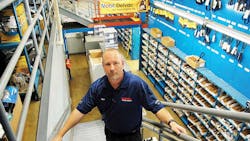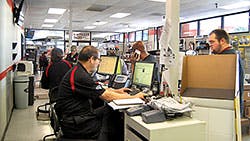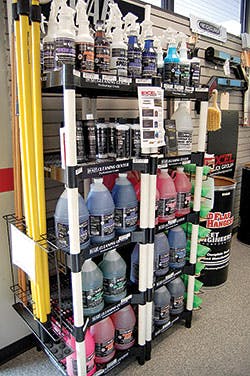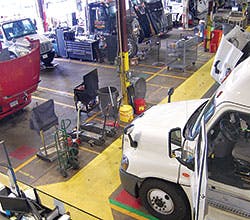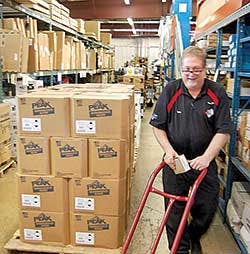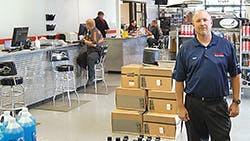Excel Truck Group’s Chester, Virginia, location has tripled its parts sales in the past seven years
As Ryan Brooks prowls the parking lot at Excel Truck Group’s Chester location in suburban Richmond, Virginia, he talks about the parts world that he has known for 27 years.
He goes to work every day with a passion that hasn’t been diluted or marginalized by time.
“It’s an ever-changing world,” says Brooks, who has been at Excel for 15 years. “No two vehicles are alike, typically. I like a challenge. So always having to find new items and react to design changes—that always interests me. If it was the same old stuff every day—same vehicle, same everything—that would be boring. But parts change.”
It’s especially stimulating for Brooks because he’s the parts manager at a facility with 44 parts employees and an 11,280-square-foot bulk parts warehouse that serves the dynamic I-95 corridor that runs the entire length of the East Coast. Along with Atlanta and Charlotte, Richmond is one of the top trucking areas on the East Coast, and many fleets operate out of Richmond and the coastal Carolinas.
The facility was built in 1995, but the biggest driver in the parts explosion came in 2009, when the facility—then known as Virginia Truck Center of Richmond—condensed two locations.
The size of the warehouse was doubled by building a second deck, a large bulk storage facility was added in the lot, and a new trailer and body shop was built.
In the past two years, the showroom was remodeled, doubling the size to 30x50 feet.
The result? Parts sales have tripled at the Chester location.
“It’s been a good experience,” Brooks says. “It’s been fun watching it grow.”
Another big step came on March 1, when the name was changed to reorganize the company’s seven stores. The groups used to be known as Virginia Truck Center (encompassing the locations in Richmond/Chester, Roanoke, Weyers Cave, and Virginia Beach), Charlotte Truck Center (Charlotte, North Carolina), and Columbia Truck Center (Columbia, South Carolina). But now they’re all known as Excel Truck Group, and a location in Statesville, North Carolina, was added in August.
“We did this mainly to unify our stores,” fixed operations manager Travis Hepburn says. “We had customers down in the Carolinas that didn’t know we were all affiliated. People in Charlotte were saying, ‘We’re the Charlotte Truck Center, but we’re part of the Virginia Truck Center Group.’ So it was better for us and our customers to footprint it and brand it as all Excel Truck Group. Also as we grow, which we all hope to do, and acquire more dealerships, then we can all have the same name. There was no change in ownership. Everything is exactly the same as it was. We just didn’t want anybody to tie us in with anything geographic.”
The company was founded in 1981 by Frank Ellett and provides trucks, trailers, parts, and professional service to customers, carrying an extensive inventory from Freightliner, Detroit, Western Star, Mack Trucks, Isuzu Trucks, Sprinter, Fuso, Kalmar Ottawa, Caterpillar, Cummins, Dorsey, MAC Trailers, Wabash National, Talbert, and a wide variety of after-market manufacturers. In addition, Excel can transfer the needed parts from any of its locations, get the part from its dealer vendors, or find parts from local suppliers.
Charlotte, Chester, and Roanoke are the biggest of the six. Charlotte is the largest location in terms of sales volume, but it does not have a body shop or trailer shop and has to sub out all work. Chester, Roanoke, and Weyers Cave all have trailer shops, but Chester also has truck and body shop repairs.
The Chester parts department’s 44-employee roster includes full-time and part-time for day and night shifts that cover the 7 am to midnight time slot. Three night-shift workers come in at 4 pm and work until midnight.
The front counter has four workers who handle walk-in sales, seven in the phone room, two at the rear parts counter that services the truck shop, one at the body shop and one at the trailer shop in a separate building that takes care of only their needs. The rest of the staff includes two in inventory control, along with warehouse and delivery drivers.
Aggressive delivery philosophy
The Chester location runs 16 trucks daily, with local deliveries within 35 miles done twice a day and long-distance deliveries as far as 150 miles.
“It could be a combination of anything in truck and trailer parts—anything a customer needs, whether it be an axle for a trailer assembly or a light he needs to get a truck up and going,” Brooks says. “We have regular route days we call on these customers. We go to almost all long-distance customers twice a week. We cover a good portion of the state and go almost as far as Washington, DC, and the edge of North Carolina off I-95. We run to Virginia Beach once a day. We go west three times a week, Monday, Wednesday, and Friday, as far as Charlottesville, Virginia. Out of this location we cover about three-quarters of the state.
“It’s very aggressive, but that was one of the things we found that would help grow our business—offering increased delivery service to our customers.”
Brooks says new building and rebranding strategies are nice, but the key to the Chester location is the people.
“We pride ourselves in trying to get the best talent in the region,” he says. “That’s what made us successful. We try to go after aftermarket guys, bring them in, and teach them how to look up parts by serial number. It’s easier to teach them serial numbers than it is to teach them the aftermarket side. That’s what helps us here. That’s what makes the difference here. It’s those guys who can find parts without the VIN number. That’s what helps. That’s really what makes the difference.
“Mack and Freightliner do offer some webinars for training, but we found that it’s better to pair up new hires with a team member. We try to put new hires beside a seasoned guy and let them teach them. There’s no playbook or exact training on that, so we found it’s just better to put new hires with a seasoned employee. That seems to work best for us. Unfortunately some of these webinars don’t teach them what they need to know out here. It teaches them something about VIN, but when that customer drops a part on the counter in front of them, it doesn’t teach them that.”
Combining truck and trailer parts also has been a boon to the entire operation.
“Over the years, I’ve seen stand-alone trailer parts places and stand-alone truck parts places, but it seems like there’s always something that works in conjunction with them,” Brooks says. “So we have a dedicated trailer parts counter on the front counter, and we also train them that they can do truck stuff. Also, the vast trailer knowledge of our guys has helped teach other folks about trailers and also how parts work in conjunction with the truck.
“We’ve just found that it’s a win-win to have both of them here at our facility. That way a customer can come in for a one-stop shop. Where he needs something for that tractor or he needs something for a trailer, we have someone who can help him. It’s been that way for 20 years. I’ve been here almost 15 years myself. We’ve just grown.
“Just having this facility helps. A lot of facilities can’t house a truck and trailer. We can. We have truck and trailer parking. We have access so they can turn around and maneuver in and out of our location fairly easily.”
Brooks says trailer parts is a “tough business” and very competitive because of the number of entities trying to sell trailer parts, but it’s also a very good market.
“Having a full-service shop out back that does fab work and restoration has been a home run for us,” he says. “Whether it be a brake job or a full restore to a trailer, it’s been very good. Wabash is a great partner. Aurora Parts controls their parts, and they’ve been a positive influence on parts availability. We do struggle sometimes with the odd trailers—getting materials on what these trailers were built with. This is very difficult at times for some of the one-off trailers. But the thing about trailers is that most times we’ve got it in our shops, so we’re able to see it to identify what we need.
“Wabash has been a very good product line for us. You see a lot of Wabash out on the market. We’ve got some very confident sales members here and also out of Roanoke, where we’re headquartered. Trailers sales leads come from Roanoke and are funneled down to our sales team here. So it’s been a very good partner for us.”
However, Brooks says he has to work a lot harder on the trailer side than on the truck side to manage inventory, largely because many of the truck OEMs have their own dealer-managed inventories.
“The truck manufacturers are a little more advanced,” he says. “Most of the major truck manufacturers have their own dealer-managed inventories. The trailer side is more of a manual process where we create every order. On the truck side, with all the folks managing our inventory, they’re able to react faster to spikes in sales, or slowdowns in sales. Most of trailer orders we monitor on a weekly basis.
“With the truck side of it, they are viewing our sales daily. They are tied directly to our DMS and are reviewing daily what goes in and comes out of the building. With them seeing how many we sell every day, they are able to see it instantly, where on the trailer side it takes a lot more digging on our part to review those sales and make sure we’ve got adequate inventory.”
Monitoring inventory
He says Mack and Freightliner both do a “sensational job,” sending out daily emails to review performance or notify Excel if there’s a problem with a part or if there are part-number changes. He says Mack sends out an email every day at around 5:30 pm to alert Excel of spikes in inventory or lows in inventory.
“It helps us plan better and look at things better,” he says. “It may be a seasonal item or may have been a one-time sale, but that helps us evaluate inventory and make sure we’ve got the right stuff on the shelf. It’s been a great thing.”
Excel has been on dealer-managed inventory for roughly 10 years with both Mack and Freightliner. Over the last 18 months, Freightliner has moved to a new company called RIMpro.
Brooks and two other parts employees monitor the reports daily, and they also have two inventory-control employees who work in an office next to Brooks’ and help monitor those transactions.
“Right now, I think it’s working very well,” he says. “We sometimes question the amount of inventory we get. But as we review it over the long haul versus looking at it by the piece number, it’s been very successful for us. A lot of times they will load us up on smaller dollar figure numbers so we’re not getting it every day and handling the same part every day, where we might only have to handle that part every few weeks. That saves us in personnel expense by not handling the same items over and over again every single day. With some of the older systems we had, it was every single day.
“We’re worried about getting too much inventory, and sometimes not enough. But then you have to analyze the spikes. ‘We went from selling three a month to selling three in one day, and that’s why we’re having it’—that would definitely be classified as a spike.
“We also manage obsolescence. We look at it monthly. We write off older, aged inventory monthly, a small percentage. We also work very hard with our manufacturers to get returns. We run reports monthly. Our parts managers run their own, and we also have a corporate parts manager that assists us in making sure we have all the reports we need and are aware of it. We also have a monthly call with all parts managers and a consulting company that facilitates it, and we talk about inventory. We talk about non-moving stock and non-moving dollars. Not just the pieces but also the dollars.
“We talk about what’s aged—what’s over 12 months, and what’s getting ready to age and is in that seven- to 12-month range. So we’re always trying to focus on that. We’d much rather have the right stuff in stock than the wrong stuff. It’s just amazing that things that were top movers—the way the cycle of the parts goes—can go within a year from a fast mover and drop right on down where it’s something you’re considering possibly returning to the vendor. We work very hard. We would rather spend our money on good, hot-moving items.”
Describing which parts are moving right now, he says, “In our area, the economy is still very good in the trucking industry. We sell a lot of reman products. We sell a lot of brake shoes. We probably sell 25 trailer loads of brakes a year out of this one location. So brakes and drums and hardware are the very top movers for us. Detroit is our largest engine line, and we sell a lot of Detroit.”
As he walks through the showroom, he describes the strategy for the setup and display of parts. They angled the gondolas so the counter salesmen could see the customers and the customers could see the salesman. The idea is to funnel traffic back to the salesmen. And there are a lot of impulse items right at the front door.
“Over the years, we’ve found that if you have smaller impulse items in the showroom, you will sell them,” he says. “If you don’t, you won’t sell them. The brake cleaner. The air bags. This is a very common air bag on Freightliner trucks. So we keep them priced right and have them right out front.”
Building for the future
Through the end of July, Class 8 sales in the United States had decreased 19% for 2016 compared to the first seven months of 2015. But Brooks isn’t concerned. He thinks it will benefit Excel because customers are holding onto older equipment and will buy some much-needed parts, whether it’s overhauls, transmissions, or brakes.
“I think we’ll still see customers that absolutely have to have new equipment, but I think we should at least hold our own,” he says. “I can’t say that in 2016 or 2017, we’ll grow sales, but I think we’ll at least be flat. We’ve had some really good years the last couple of years, so there are some numbers there that are tough to match. We’re about 80% above what we were this time last year. And we were even better in previous years.”
Brooks and management at Excel’s Chester location remain very positive about the future. So positive that they’re in the process of expanding even more. The remodel would: take the parts warehouse to over 14,000 square feet by adding another double-deck section to the main building, allowing them to remove seven 40-foot-long containers that are storing parts at the loading dock; move the loading dock, opening up that area inside the building for smaller trailer items and suspension parts; clear out 15 acres of the wooded area on the 40-acre property to allow for more parking.
“We’re looking forward to that,” he says. “We’ve got architects working on it now. It should be completed by the summer of next year.”
As he stands at the loading dock, he reflects on a wild morning.
“We’ve gotten bombarded today with shipments,” he says. “Today, we had four truckloads alone. It’s a good problem to have.”
For more information check out Excel Truck Group, Chester VA
About the Author
Rick Weber
Associate Editor
Rick Weber has been an associate editor for Trailer/Body Builders since February 2000. A national award-winning sportswriter, he covered the Miami Dolphins for the Fort Myers News-Press following service with publications in California and Australia. He is a graduate of Penn State University.
